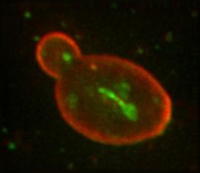Megan Lenardon, Andrew Porter, Donna MacCallum & Soumya Palliyil

New treatments for conditions such as cancer include antibody-based drugs. Antibodies offer distinct advantages over conventional drugs because they recognise their target with very high specificity. This means that diseased cells can be targeted for killing without affecting surrounding healthy cells. The lessons learned from the development of antibody-based cancer drugs can be applied to antifungal treatments to provide a much needed alternative to the current inadequate range of chemical-based antifungal drugs, and the same new antifungal antibodies could also be used in the development of better diagnostic tests for serious fungal infections.
The objective of this work is to demonstrate the combined therapeutic and diagnostic utility of two antibodies that recognise a target on the surface of fungal cells. Laboratory tests will be performed to evaluate whether the antibodies kill or inhibit the growth of fungal pathogens. In addition, the antibodies will be tested in models of serious fungal infection and for their ability to detect their target in infected blood and urine samples.
